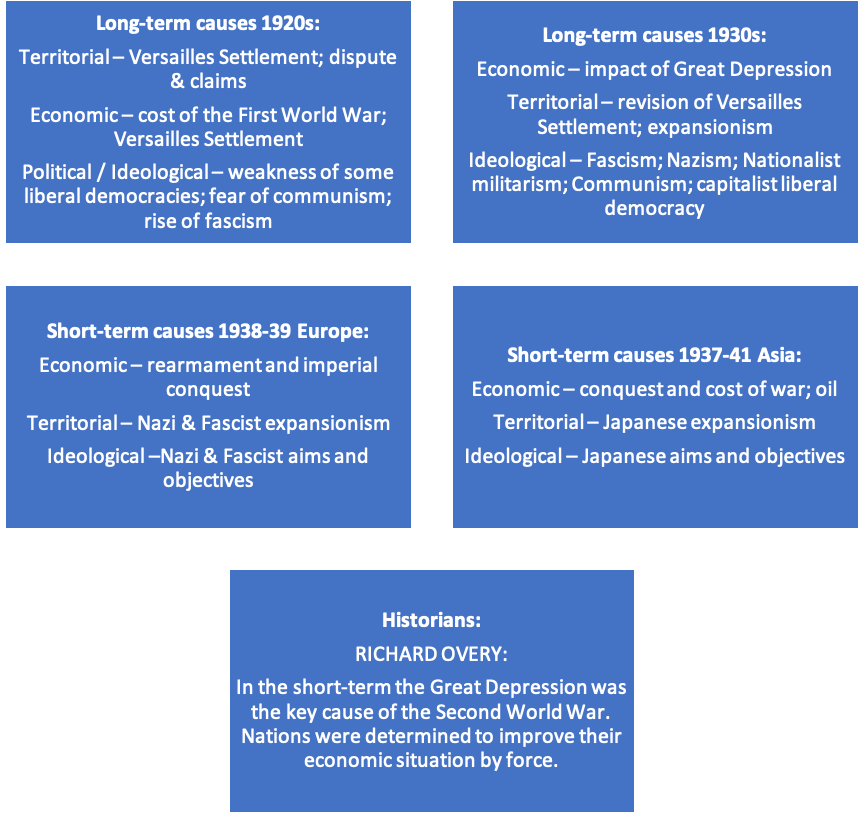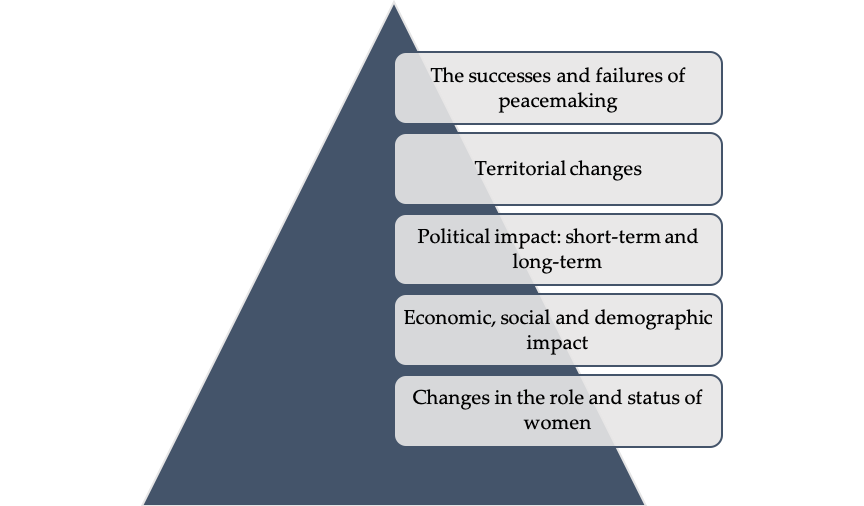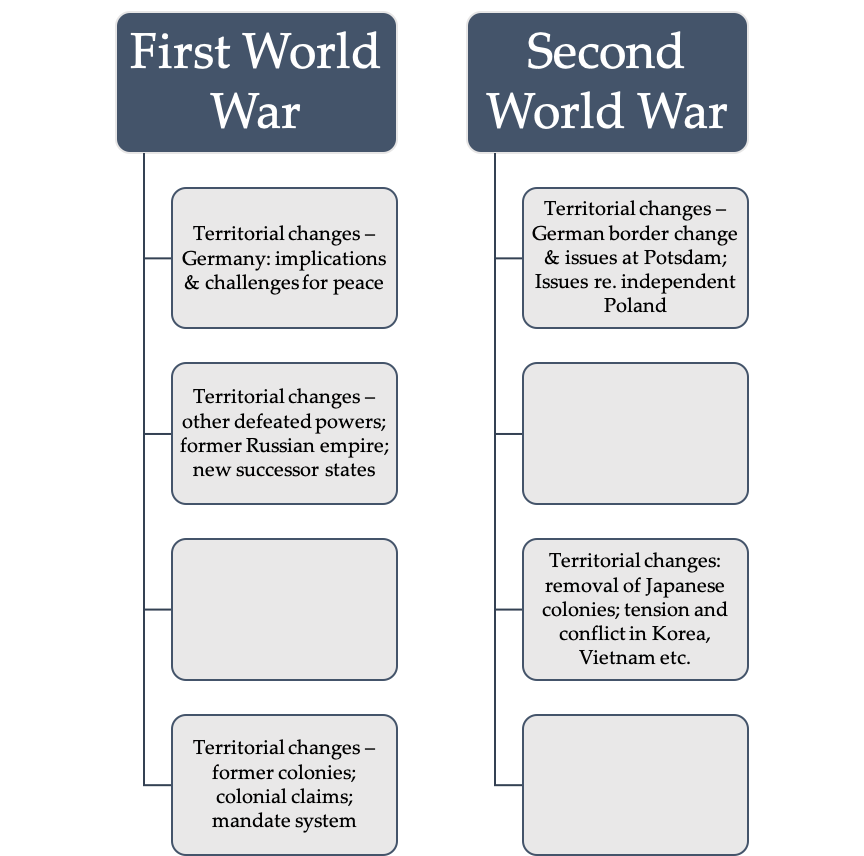5. Second World War: Essay planning for Paper 2

Second World War essay planning
This page contains essay plans and essay writing activities on the Second World War. For comparative essays involving the Second World War, please go to the comparative essay writing page: Comparative essay planning for causes, practices and effects of wars.
Task One
ATL: Thinking skills
When considering the causes of wars for Paper 2 you will need to understand how the following related concepts apply to the case studies you have covered.
Ideological causes
Political causes
Economic causes
Territorial
Other causes
In pairs match the outline explanation to the corresponding concept in the table below.

Task Two
ATL: Thinking skills
The command terms of an essay question tell you how to focus and structure your essay.
Check your understanding of the command terms below and then do the activity which follows.
(There is further discussion of the meaning of the command terms on this page: Essay writing for Paper Two)
Compare – give an account of similarities
Contrast – give an account of differences
Compare and contrast – give an account of similarities and differences
Example: Compare and contrast the role of air power in two 20th century wars.
Discuss – offer a balanced review and include a range of arguments [thematic approach]
Example: Discuss the social and economic effects of one 20th century war.
Evaluate – consider the strengths and limitations
Example: Evaluate the role of technology in determining the outcome of two 20th century wars.
Examine – consider an argument in a number of ways / interrelationships
Example: Examine the role of economics in causing two 20th century wars.
To what extent – give an argument for and against
Example: To what extent were territorial disputes the cause of one 20th century inter-state war.
Activity:
In pairs draft your own Diploma style essay questions for the Second World War using the command words and the prescribed content and themes for Topic 11.
Task Three
ATL: Thinking and self-management skills
Review the long-term and short-term causes of the Second World War in pairs. You can use the summary / flash cards below as a starting point.
Thematic / conceptual Causes of the Second World War

Task Four
ATL: Thinking skills
Using your review notes, In pairs, plan the following essay question:
Discuss the impact of long and short term factors on the outbreak of one 20th century war.
Task Five
ATL: Thinking skills
In pairs review the essay outline below that uses the case study of the Second World War for the question:
To what extent were economic factors significant in causing one 20th century inter-state war
Paragraph 1: The effects of the First World War were a long term economic cause of the Second World War as there was instability and insecurity.
- Cost of WW1; impact of Versailles Settlement – weakness of European economies led to insecurity, economic terms of settlement weakened new liberal democracies; led to direct military intervention by French in 1923, undermined League and collective security, reliant on US economy [outside League].
Paragraph 2: The Great Depression that impacted globally in the 1930s was the most significant economic cause of the Second World War as it led to a collapse in international trade and domestic instability and crises
- Rise of Hitler directly related to rise in German unemployment. Details of economic impact of depression on Germany, US loans etc. Hitler’s actions in 1930s, rearmament, Anschluss, and expansion Eastwards were economically motivated.
- Mussolini’s Italy, although less directly impacted by Great Depression was also driven by economic motives to invade Abyssinia in 1935 as his Corporate state was failing and there were potential material gains and a distraction from domestic issues in a war of conquest in East Africa.
- Japan’s economy was also devastated by the Great depression, silk, US loans etc. Japan’s invasion of Manchuria in 1931 was economically motivated to gain raw materials, markets etc. Japan’s invasion of South East Asia economically motivated to maintain war in China after 1940, and attack on Pearl Harbour was economically driven re oil.
Paragraph 3: In addition…
- Arguably, the inability of the League to respond effectively to acts of aggression and expansion was due to it dependency on economic sanctions… Britain and France were also economically motivated to appease the aggressor states due to domestic economics issues….
- USA isolationist lobby was economically motivated… Japan key economic asset, view of Japan bringing order good for business in China… delayed economic sanctions…
Paragraph 4: However, Ideological factors were also a key cause of the Second World War as extremist ideologies such as Nazism had aims that could only be achieved through war…
- Nazi ideology aimed to unite all Germans / Aryans to create a dominate Third Reich empire in Europe. It identified the Slavs as ‘subhuman’ and aimed to conquer countries in the East and turn the Slavs into a slave race for the Third Reich. Nazi ideology’s main focus was the destruction of Communism and the USSR. Once in power, Hitler pursued his ideological goals… actions in 1930’s through to invasion of Poland in 1939.
- Italian Fascism, like Nazism also promoted war and conquest, and Mussolini aimed to create a great Italian empire through conflict. Ideologically war was good for society and therefore, in the 1930s he pursued his ideological aims… 1935, 1936… ideology was a driving factor in uniting to Nazi Germany and Fascist Italy and led to the end of League’s power, Stresa etc.
- Japan’s militarists became increasingly ideologically motivated allying with the fascist powers in the Anti-Comintern pact, attitude towards other Asians, justifications for expansion of control in China, actions in China and occupied territories, Tripartite Pact.
Paragraph 5: It could also be argued the British policy of appeasement was driven by the fear of Communist ideology.
- It could also be argued the British policy of appeasement was driven by the fear of Communist ideology… events re. appeasement of expansion eastwards, Munich… NIC in Spain, failure to work with USSR in anti-fascist Popular Front. In addition, there were key political limitations for liberal democracies, e.g. impact of popular opinion and pursuit of appeasement and neutrality. US concern at potential for increased Soviet influence in China, CCP from 1921 etc. Role of Communist USSR, ideology re. western capitalism, shift to agreement with Hitler – Nazi Soviet Pact.
Paragraph 6: Nevertheless, it could also be argued that the causes of the Second World War were more traditional territorial claims and ambitions…
- Territorial elements of Versailles Settlement; evidence of territorial disputes in 1920s in Europe and Asia.
- Hitler’s aims and actions once in power – revise territorial clauses of Versailles 1934-38; aims and actions to gain lebensraum - living space 1938-39; further imperial ambitions hegemony in Europe, overseas empire
- Italians aims and actions in 1930s – territorial expansion of empire in East Africa; living space; domination in med and Balkans
- Japan’s actions were motivated by territorial ambitions, the conquest of living space for its surplus populations… 1931… empire building…
Task Six
ATL: Thinking skills
On paper 2 you are often asked to consider two case studies. In pairs, select another relevant war you have studied and use some of the ideas in the outline above to develop an essay plan for the following question:
‘Economic factors were the most significant cause of 20th century wars.’
With reference to two wars, discuss this claim.
Consider:
- Role of long-term economic factors in causing the Second World War
- Role of short-term economic factors in causing the Second World War
- Role of economic factors in causing xx [other case study]
What other factors led to each of these conflicts? Other factors could be used to offer some ‘balance’ to your discussion of the claim in the question.
Task Seven
ATL: Thinking skills
In pairs, plan out the following essays using the Second World War as your example:
- To what extent was role of ideology key in causing one 20th century inter-state war.
- ‘Wars are generally caused by territorial disputes.’ With reference to two 20th century wars evaluate the validity of this claim.
Click on the eye for a suggested essay plan to the first of these questions:
Introduction: Set up the debate, explaining the two sides of the argument. You should also state what your key argument will be in the essay.
Paragraph 1: Always address the issue given in the title first. Here you need to set out aims of Hitler’s / Nazi ideology. Consider the evidence of long-term planning before he gets to power and then link this to the actions that Hitler takes after 1933 in pursuit of his ideology. Bring in the views of historians mentioned in this chapter to support your views.
Paragraph 2: Now consider the role of communism or rather the ‘fear of communism’ as a causal factor in the policy of appeasement . Look at the role of appeasement in encouraging Hitler into actions that he might not have considered otherwise. Also, reflect on whether he was brought into a war for which he had not planned. Again, refer specifically to historians here in support of these arguments.
In his book Churchill, Hitler and the Unnecessary War: How Britain Lost its Empire and the West Lost the World (2008), Patrick Buchanan argues that the critical mistake was made by Britain when it gave Poland the guarantee that made war ‘inevitable’. He goes on to suggest that by doing this, Britain unleashed the ‘bloodiest war in all of history’, lost their own empire and created the conditions for the ensuing Cold War.
Paragraph 3: A counter-argument could be that it was a continuity of German foreign policy ambitions rather than a war caused specifically by Nazi ideology . There was in fact a great deal of continuity between World War I and World War II. This is a major argument of Fritz Fischer. Fischer suggested that there was continuity in the aims of German policy-makers in 1914 and Nazi leaders in the 1930s. This continuity was founded on the powerful industrial and landowning classes, which remained in authoritative positions. They had played a vital role in bringing Hitler to power in 1933. Both Wilhelmine and Nazi Germany wanted to establish control over Eastern Europe to provide economic benefits.
When comparing and contrasting the objectives of German foreign policy prior to both world wars, there are some vivid similarities: Wilhelmine Germany was pursuing an expansionist foreign policy before 1914, and attained this goal, temporarily, in Europe in the Treaty of Brest-Litovsk. The domination of Central and Eastern Europe, and the creation of an overseas empire, were objectives for both Kaiser Wilhelm and Hitler.
Conclusion: This should reflect the weighting that you have given the different sides of the argument in the body of your essay.
Note: For Paper 3 style essays on the Second World War go to Versailles to Berlin: Essay frames and writing activities
Task Eight
ATL: Thinking skills
In pairs, using the Second World War as your case study complete a detailed essay plan for the following question. (Click on the eye below to find paragraph opening statements to help you get started.)
Examine the role of the war on the land in determining the outcome of two wars between states.
Note: 'Examine' – requires you to explore the theme of the questions in a number of different ways / through different lenses.
Introduction: State that your case study will be the Second World War and XX. Explain your main thematic points through which you will examine the role of the war on the land in determining the outcome, including the idea that the final outcome was also determined by events in the war at sea and in the air.
Paragraph 1: The war on the land determined the outcome of the Second World War in Europe...
Paragraph 2: Furthermore, it could also be argued that the war on the land was important in determining the outcome of the war in Asia…
Paragraph 3: The war on the land was also significant in determining the outcome of XX war…
Paragraph 4: Nevertheless, allied success in the war on the land may have been determined by aerial warfare in the Second World War…
Paragraph 5: In addition Allied victory in the Second World war may have been based on success in the war at sea which was often key to waging war on the land…
Paragraph 6: Indeed, in XX conflict the naval warfare was a significant factor in the outcome…
Task Nine
ATL: Thinking and self-management skills
Review the effects of the Second World War and organise detailed notes under the following themes.

Task Ten
ATL: Thinking skills
In pairs plan the following essay question:
‘Territorial changes were the most significant challenge to successful peacemaking.’
Discuss with reference to the effects of two 20th century wars.
The chart below uses the First and Second World War as case studies, and can be used as a starting point for your essay planning:


 IB Docs (2) Team
IB Docs (2) Team
